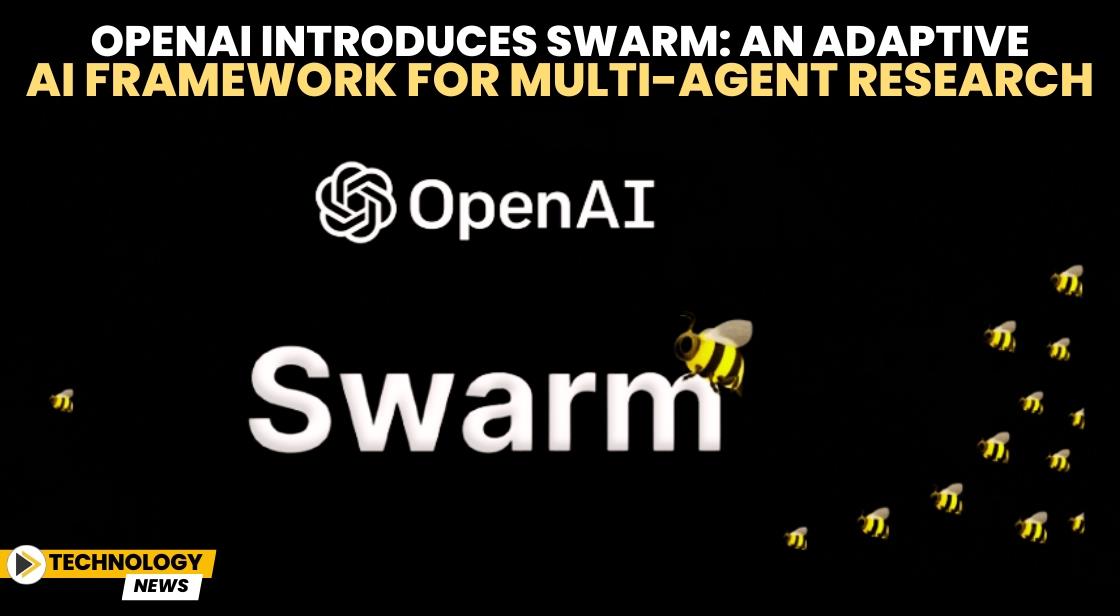OpenAI Introduces Swarm: An Adaptive AI Framework for Multi-Agent Research

News Synopsis
OpenAI has launched a new experimental framework named Swarm, designed to enhance the interaction and collaboration among multiple AI agents. This innovative initiative equips developers with the necessary tools to create networks of AI agents that can operate autonomously, handling complex tasks with minimal human intervention. Despite its low-key introduction, Swarm has the potential to significantly influence the future landscape of artificial intelligence. OpenAI has emphasized that this framework serves as a research and educational experiment, akin to the way they initially positioned ChatGPT in 2022.
The Future of Autonomous AI Systems
Swarm presents a vision for a future where AI systems possess the ability to autonomously search through multiple sources, returning comprehensive answers to queries. This capability could empower AI to execute tasks across various websites or even take actions in real-world situations on behalf of users. Nevertheless, the introduction of such autonomous systems has prompted concerns regarding their impact on employment and the reliability of AI-generated decisions.
Understanding How Swarm Works
At the heart of the Swarm framework are two essential components: Agents and Handoffs. An agent is defined by OpenAI as an AI entity equipped with specific instructions and tools, enabling it to autonomously accomplish tasks. If necessary, an agent can "hand off" its task to another agent, facilitating smooth task delegation among the network.
Swarm prioritizes lightweight, controllable, and easily testable collaboration among agents. Unlike traditional systems limited to isolated functions, these agents can represent specific workflows or distinct steps within more intricate operations, such as data retrieval or transformation. This modular design allows complex processes to be broken down into manageable actions distributed among various agents, enhancing efficiency.
Accessibility of Swarm for Developers
To promote exploration and innovation, OpenAI has made the Swarm code and associated resources available for free on GitHub. This accessibility provides developers with a unique opportunity to delve into the framework's capabilities. However, OpenAI has clarified that Swarm is not an official product but rather an experimental tool. Shyamal Anadkat, an OpenAI researcher, likened it to a cookbook, offering experimental code for constructing simple agents. He noted that it is not intended for production use and will not receive ongoing maintenance.
Concerns Regarding Job Displacement and AI Risks
The launch of Swarm coincides with a broader trend in the tech industry, focusing on developing multi-agent AI systems for enterprises. While these systems promise increased efficiency and autonomy, they also raise significant concerns about potential workforce displacement, security vulnerabilities, and biases in decision-making.
One of the predominant fears is job displacement, particularly among white-collar employees. Critics argue that automated networks like Swarm could lead to substantial layoffs, whereas proponents suggest that these technologies may transform jobs rather than eliminate them altogether. This shift in the employment landscape necessitates a careful examination of how such innovations might redefine roles in various industries.
The Importance of Oversight in Autonomous Agents
In addition to concerns about job displacement, there are inherent risks associated with autonomous agents potentially malfunctioning or making biased decisions. If left unchecked, these systems could pose significant security threats. To address these challenges, OpenAI emphasizes the importance of rigorous evaluations and encourages developers to implement custom evaluation tools to assess the performance and reliability of their agents.
The Role of Swarm in Responsible AI Development
Given its experimental nature, Swarm is poised to play a pivotal role in the ongoing dialogue about balancing technological innovation with responsible AI development. As developers explore the framework's capabilities, it will be crucial to address ethical considerations and establish guidelines that promote safety, accountability, and fairness in AI systems.
Conclusion: The Path Forward
The introduction of OpenAI's Swarm framework marks a significant step forward in the realm of multi-agent AI systems. While it offers promising advancements in efficiency and task automation, it also necessitates a cautious approach to mitigate risks associated with job displacement and autonomous decision-making. As the tech industry continues to evolve, frameworks like Swarm will undoubtedly influence the future trajectory of artificial intelligence, shaping how we interact with and rely on AI systems in our daily lives.
You May Like









